Night Of The Hunter Outtakes
Written by Joe D on August 10th, 2008Laughton reads from the Bible in an unused scene
I went to see the Night Of The Hunter Outtakes last night and I’m glad I did. It was an excellent show, narrated by the restorer, really the man responsible for this wonderful artifact existing at all, Robert Gitt. By the way the show was packed! This magical film draws people, even it’s outtakes! And it wasn’t just a bunch of academics, there were all ages and types of people. It’s sort of especially wonderful considering that Laughton had thought he failed in making this film. That the film was basically a flop when it was initially released. I blame United Artists! They had a technique of under budgeting films, then when the filmmakers were faced with needing more money or shutting down, UA would swoop in and supply the cash but take all rights, profits, etc. They used this same technique on my pal Robert Downey when he directed Pound for UA. But back to last night, I was extremely gratified to see that Preston Neal Jones, the author of the incredible Heaven and Hell To Play with- The Filming Of Night Of The Hunter was there. I love this book and I think it should be required reading at every film school in the country, on second thought the world! He is a very nice guy, very humble, and was so pleased that people liked his book and had many complimentary things to say about it. I wrote about the book in a previous post, check it out here.
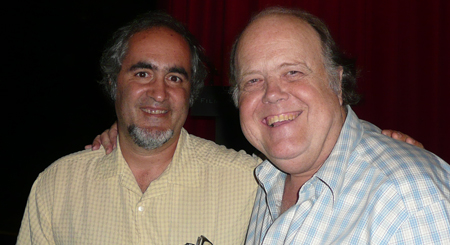
Me & Preston Neal Jones, I know I look like a psycho
Anyway the show was great, Bob Gitt narrated the proceedings from a podium at the side of the stage, first he gave a bit of history of the footage, Laughton’s widow donated the footage to the AFI back in 1974. Students there began using it as fill leader, i.e. just to fill spaces between sections of magnetic track, in other words as junk film. Someone noticed this and put a stop to it and the film was shipped to the AFI in Washington D.C., Bob Gitt worked at the AFI and found out about the film. He later moved to UCLA and got the film shipped back to LA and began restoring it. It took 20 years of work to get it pieced back together and restored! Thanks for being so resolute!
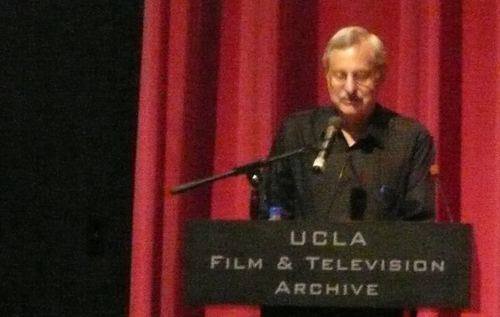
Bob Gitt, restorer and narrator
The first scene was something Laughton shot for the opening of the film, a close up of himself reading from the Bible, it was never used but I think some of the audio may have appeared on the soundtrack album. Some of the highlights were, seing scenes that didn’t appear in the movie. For example a nighttime shot of downtown Cresap’s Landing where Robert Mitchum first comes to town, This was replaced by a stock footage shot of a locomotive steaming furiously at the camera. A wise move by Laughton and Robert Golding, the film’s editor. Outtakes of Mitchum screwing up were always amusing, especially when 5 year old Sally Jane Bruce would tell him ” You forgot your lines again”.
There was footage of the actor originally cast to play Uncle Birdie, a much more mild mannered man than James Gleason who replaced him. I think if he had continued in the part it would have been more realistic, less showbiz than James Gleason. I guess Laughton felt he needed more energy in that part. It’s pretty cool to see Robert Mitchum dressed as the Preacher sitting in his jalopy on a dark stage, then a slate comes in , the background projection starts, they begin rocking the car and Mitch starts speaking to the Lord! Incredible! Shelly Winters acts up a storm in this film. In the outtakes from her torchlit testifying scene she seems on the edge of a psychotic episode. Lauhton’s off camera voice commands her to say a prayer, any prayer and she begins chanting in Yiddish! This got quite a reaction from the crowd. Another powerful scene dealt with in depth is the one where Mitch kills Shelly. She’s alone in bed, illumined by a shaft of moonlight, a beatific gleam in her eyes, she’s at peace with her God and about to join him. Laughton hammers at her relentlessly, tweaking her performance, giving line readings, stopping her in mid sentence, starting her over. Bob Gitt included all the outtakes of this scene ostensibly to demonstrate what a great director Laughton was, how he shaped Winter’s performance but for me it had a different effect.
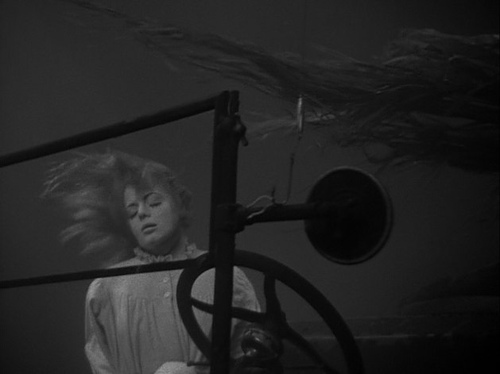
Robert Mitchum and Shelly Winter’s and many other members of this cast were excellent even incredible actors. That they would allow someone to constantly interrupt them, give them readings, talk at them the whole time they were on camera is a sign of the respect they had for Laughton. I think they would have told anyone else to shut the hell up! Laughton, a great actor, basically played every part in the movie off camera, often delivering the lines of whoever was in a scene but not on camera, playing the little girl or the boy’s father or whoever. I did feel he created a tension with his off camera direction that added to the depth of seriousness or weight of particular scenes but I think his real direction was probably given in the preliminary discussions with the actors, especially Mitchum and Winters. It’s fascinating to watch Shelly Winters, a devotee of the Actor’s Studio strip herself bare emotionally. It’s like being in her psychiatrist’s office during an especially heated session. But I think this is one of the things that makes a great actor, the ability to expose true naked feelings, things everybody else tries so hard to hide. A tribute to Laughton’s genius is the fact that he allowed Shelly to go to that point of hysteria but the used the more restrained takes that were in the end much more effectual. It’s also great to see Lillian Gish’s outtakes, once again Laughton is on her like an octopus, she begins a take ” Too Much!” bellows Charlie time and again and he’s always right. Another tragic element connected with this film is put clearly on display by screening these scenes, the talent of Billy Chapin who played John Harper. He took direction like an old pro, capturing nuances Laughton demanded of him. He was a great actor at that young age and yet he never worked again! I don’t get it. Another example of the stupidity of the Hollywood system. I have a theory about Laughton, I think he was a tortured soul, gay at a time when that was anathema to a career, having to live a secret life of self-loathing, I think he used this in his performances, like his great Quasimodo, read Fun In A Chinese Laundry and see what von Sternberg said about his acting in the unfinished I, Cladius, it’s all about torturing himself to give a good performance.
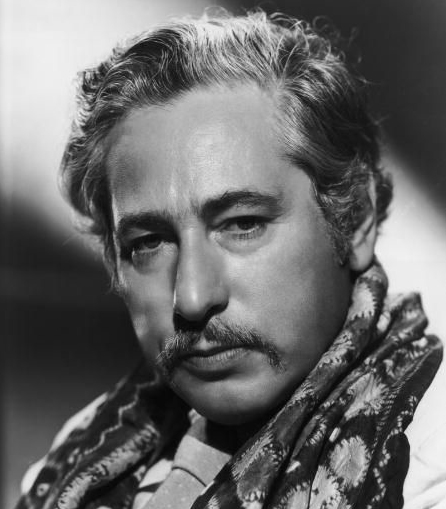
Von Sternberg
I think he projected his technique that he used on himself onto the actors in this film and I think instinctively they knew what he was doing and respected it, otherwise I don’t think they would have put up with it. I’ll close my review with two musical notes. One, we get to hear Sally Jane Bruce’s original track singing the “Pretty Fly” song as they float down the river. It was later replaced by a professional adult singer, Sally Jean’s is pretty amazing, for a 5 year old to sing a minor key song acapella blew me away, she got the part because she had just won a singing contest.
Sally Mayes, she sang the beautiful version that’s on the musical theater (Varese
Sarabande) CD of HUNTER
Then over the end credits we get to hear Mitchum sing a sort of boogie woogie version of ” Leaning On The Everlasting Arms” really Cool. There are a lot of other moments that make this show so great, and make us so lucky that this material exists and that a man like Bob Gitt loves film so much that he took the time to preserve this treasure trove. I overheard Bob say they’re trying to get this released on dvd, keep your fingers crossed.
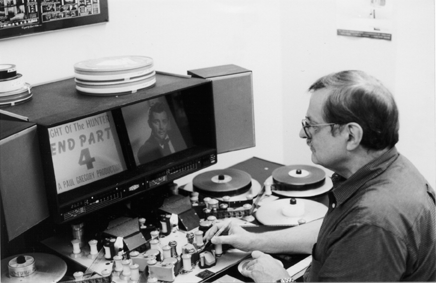

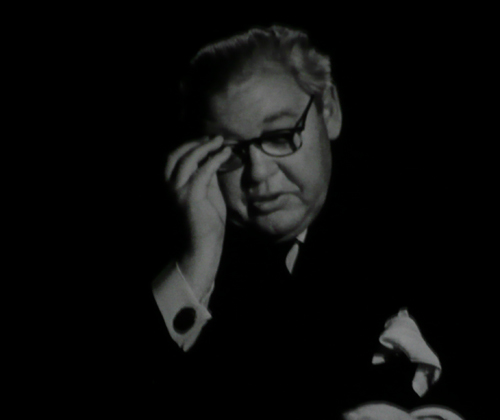
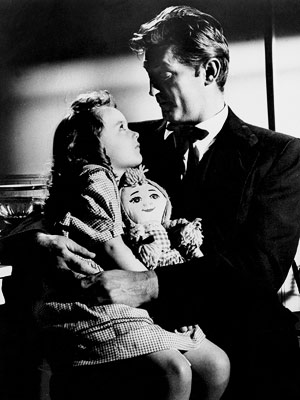
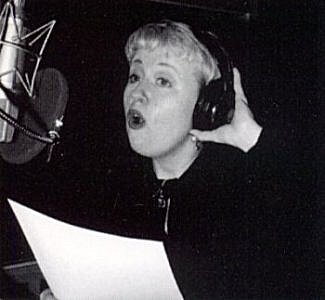
10
PM
Thank you very much for the report!
I hope Robert Gitt manages to get the outtakes released royally on DVD: There are many fans of the film all over the world who wold love to see the outtakes!
10
PM
P.S.: Sternberg’s report on “Fun in a Chinese Laundr”y is to be taken with certain caution. Having watched the BBC documentary with the surviving rushes and interviews to people who participated, it’s evident to me that Sternberg wasn’t the type who considers actors as human beings.
10
PM
Gloria
I agree Sternberg comes across as an egomaniac, and the surviving footage shows Laughton would have been great as Claudius but all that aside I think it reveals the process Laughton would put himself through in creating a role.
p.s. I mentioned you to Preston Neal Jones and he knows who you are, unfortunately we didn’t get to speak much more as he was besiged by admirers wanting their books signed.
11
AM
You’re right that Laughton’s full-immmersion method could be difficult (least of all, for himself), in Simon Callow’s perception, he sort of gave such a heavy involvement -on average- with roles after “Hunchback of Notre-Dame”.
Still, the difficulties varied depending on the director: Laughton, who while growing up had never met any encouragement or support on any of his artistic leanings (be it love for theatre, or literature), was inevitably plagued by insecurities throughout his life… I think that is why he worked well with directors who were good managing actors and knew he needed to be reassured: examples of this would be Jean Renoir (in movies) or Norman Corwin (in radio). Irving Thalberg, who produced some of his best films, also knew that it was worth the effort to reassure him: had Thalberg not been ready to listen to Charles’ doubts about how to play Captain Bligh, maybe Charles might have fled from the picture after the first week. But then actors are generally fragile: their body is their tool and theirs is not a safe, steady job: every work they do might be the last.
As Emlyn Williams would say in the “Claudius ” documentary, Laughton needed warmth around. This is possibly why he clashed with directors like Sternberg or Hitchcock, who were superb technicians (editing, filming, framing, lighting…), but maybe not so inclined to work out the human aspects of a shooting.
Pity you couldn’t speak more with Preston Neal Jones: his knowledge about the film is awesome! But good to learn that people buys his book!